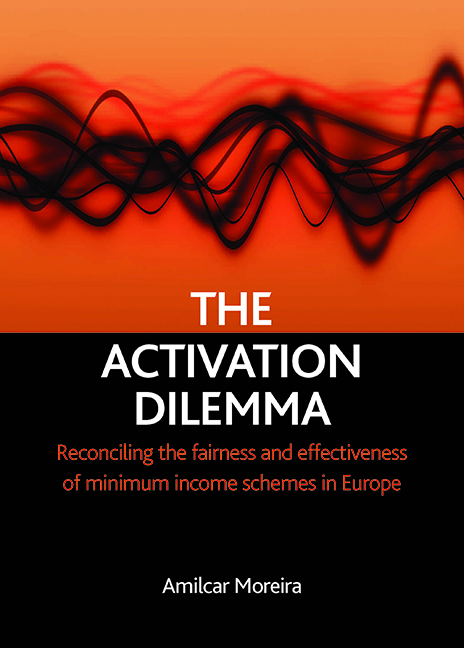 The Activation Dilemma
The Activation Dilemma Book contents
- Frontmatter
- Dedication
- Contents
- List of tables and figures
- List of abbreviations
- Acknowledgements
- one Introduction
- two The right to a minimum income: between Mead and Van Parijs
- three Justifying a minimum income guarantee: the right to personal development
- four The activation dilemma: a comparative study
- five Measuring respect for the right to personal development
- six The employment effectiveness of minimum income schemes
- seven The employment effectiveness of minimum income schemes and their respect for the right to personal development
- eight Conclusion
- Appendix A Methodology for benefit comparison
- Appendix B Unemployment reintegration capacity (URC): sensitivity analysis
- Appendix C Qualitative comparative analysis: laws of Boolean algebra
- References
- Index
- Also available from The Policy Press
two - The right to a minimum income: between Mead and Van Parijs
Published online by Cambridge University Press: 21 January 2022
- Frontmatter
- Dedication
- Contents
- List of tables and figures
- List of abbreviations
- Acknowledgements
- one Introduction
- two The right to a minimum income: between Mead and Van Parijs
- three Justifying a minimum income guarantee: the right to personal development
- four The activation dilemma: a comparative study
- five Measuring respect for the right to personal development
- six The employment effectiveness of minimum income schemes
- seven The employment effectiveness of minimum income schemes and their respect for the right to personal development
- eight Conclusion
- Appendix A Methodology for benefit comparison
- Appendix B Unemployment reintegration capacity (URC): sensitivity analysis
- Appendix C Qualitative comparative analysis: laws of Boolean algebra
- References
- Index
- Also available from The Policy Press
Summary
As seen in Chapter One, the introduction of activation requirements has generated a debate over the conditional nature of the right to a minimum income. Going through the literature, it can be observed that this debate crosses over various domains within political theory. This chapter will try to determine if the arguments presented by Mead and Van Parijs, who typify the fundamental standpoints in the literature on this topic, provide an adequate justification for the right to a minimum income.
The right to a minimum income in political theory
One of the domains within political theory that is relevant to the justification of the provision of the right to a minimum income is the set of theories that debate over principles that should regulate the functioning of political communities, more commonly referred to as theories of justice. This the case of Rawls’ conception of ‘justice as fairness’, where the author tries to determine the principles that individuals would choose to govern the functioning of social institutions and the distribution of primary social goods, that is, all the means needed to pursue a given conception of a good life (Rawls, 2001, p 35). First, Rawls states that each individual is entitled to exercise all equal basic liberties, such as freedom of conscience, freedom of expression, private property and due process of law liberty principle (2001, p 68). He then states that the distribution of social and economic inequalities must take place in a context where all positions in society are open to all citizens under fair equality of opportunity – the liberal equality principle – and in such a way that it privileges the least advantaged in a given community – the difference principle (Rawls, 2001, p 239). In light of this, it could be argued that the introduction of the right to a minimum income, in the sense that it guarantees a basic level of income that enables individuals to compete for a position in society, could be justified as a form of guaranteeing a fair equality of opportunity. In fact, as it is targeted as those most in need, a minimum income would also respect Rawls’ principle of difference.
- Type
- Chapter
- Information
- The Activation DilemmaReconciling the Fairness and Effectiveness of Minimum Income Schemes in Europe, pp. 17 - 32Publisher: Bristol University PressPrint publication year: 2008


